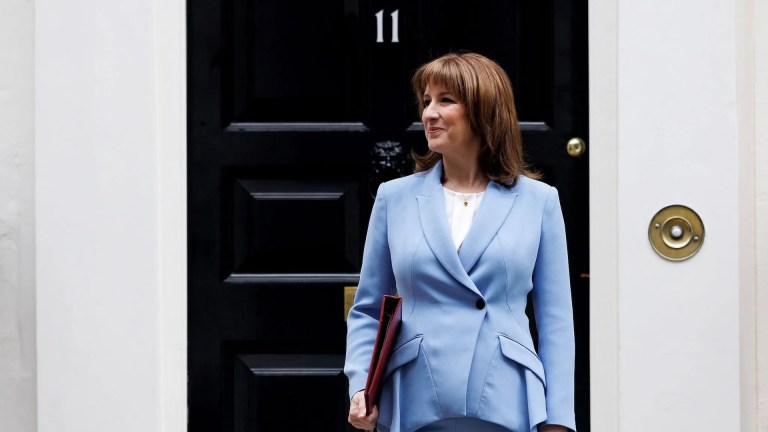“The cost of increase in NI for someone on £55,000 a year would be an extra £5 a week. People earning under £50,000 would not be affected,” Ramsay said.
The tax overhaul would generate between £50bn to £70bn per year based on current prices, she estimated.
The Institute for Fiscal Studies said that the Green Party vision would “see the size of the state increase on an unprecedented scale”.
The IFS conceded that the wealth tax would raise “substantial sums”, but said that borrowing would also have to increase.
“Even taking their figures at face value, overall borrowing would end up around £80bn a year higher and we could expect debt to be rising throughout the next parliament,” they said.
Pump money into the NHS and social care
The Green Party has conceded their policies are expensive, but say it’s “worth it” for better public services – starting with the NHS.
Advertising helps fund Big Issue’s mission to end poverty
The party would invest £50bn in health and social care to “defend and restore” the health service. The Conservatives, by way of comparison, have only pledged to increase spending in line with inflation.
The massive tax intake would pay for “a year-on-year reduction in waiting lists” – currently at record heights – and guaranteed access to an NHS dentist.
System-wide pay increases include a 35% salary hike for junior doctors.
The party would also legislate for free personal care, along the lines of that available in Scotland, and funnel an extra £3bn for local authorities for children’s social care.
New social homes and mass insulation
The Greens have pledged to build 150,000 new genuinely affordable social homes every year, and to end the Right to Buy program.
The party would launch a massive £48bn retrofitting campaign, insulating homes and installing heat-pumps. Denyer admitted the program was costly, but said it would ultimately bring down energy bills.
Advertising helps fund Big Issue’s mission to end poverty
“A warm, secure, affordable home is something that millions of people in this country don’t have”, she added. “[It is an] important a basic building block for a happy and successful life.”
Other plans include rent controls and an end to no-fault evictions.
The Social Market Foundation hailed the plans a step in the right direction.
“We welcome the Green’s plan for social housing which promises both more social housing development and retaining the existing social housing stock through ending help to buy, as previous SMF research has highlighted,” said researcher Niamh O Regan.
“Their aim for building 150,000 social homes would mean doubling of current social housing construction – it is ambitious, but with social housing as the primary housing policy focus, it is possible. They do not describe how this would be funded, however past SMF work has suggested that fairness taxes could provide £4bn in funding every year for social housing”.
Public ownership for water companies, railways and the ‘big five’ retail energy companies
The Greens would re-nationalise water and rail. It would also bring the big five retail energy companies into public ownership.
Advertising helps fund Big Issue’s mission to end poverty
Labour has pledged to renationalise rail, picking up private contracts as they expire. However, the party backtracked on plans to nationalise water. Privatised water companies paid out around £377 to shareholders for each hour they polluted last year.
Banning fossil fuels and bringing forward net zero
The Green Party would ban all new fossil fuel projects and cancel those that have been recently licensed like Rosebank.
Funding for renewables would be raised by a carbon tax, a levy on activities that lead to CO2 emissions. The party want 70% of UK electricity to come from wind by 2030.
“A secure energy supply and action in climate crisis go hand in hand,” Ramsay said. They want to get to net zero “years ahead” of the current timetable.
Mike Childs, head of policy at Friends of the Earth, said that the urgency is necessary.
“The Green Party is so far the only political party that has grasped the reality that unless we properly invest in reducing carbon emissions from our homes, industries, farming and transport, it will be impossible to avoid the huge financial and human costs of the climate crisis in the future,” he said.
Advertising helps fund Big Issue’s mission to end poverty
“Money spent on green growth is how we lower energy bills for good, create long-term jobs in clean industries and boost the economy.”
Scrapping tuition fees
The Greens say they would “fully fund” every student and bring back maintenance grants, at a predicted annual cost of £7.8bn. The party would also scrap the outstanding loans of every student who have attended universities in England since tuition fees rose to £9,000 per student in 2012.
Other education reforms include scrapping Ofsted and “ending high-stakes testing” in schools.
Guaranteed minimum wage of £15 per hour
The party want to raise the minimum wage to £15 per hour. They would also implement a 10:1 pay ratio that would limit CEO pay to 10 times the level of the lowest paid worker. Other workers’ rights plans include introducing a four-day working week.
Do you have a story to tell or opinions to share about this? Get in touch and tell us more. Big Issue exists to give homeless and marginalised people the opportunity to earn an income. To support our work buy a copy of the magazine or get the app from the App Store or Google Play.









